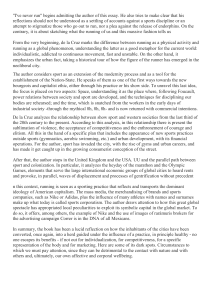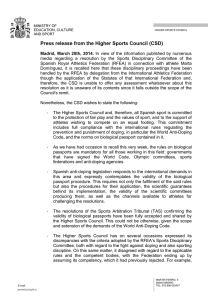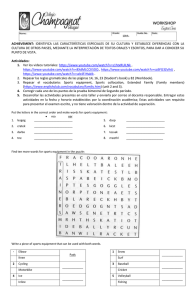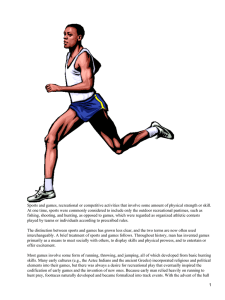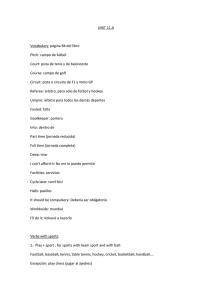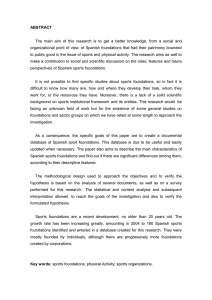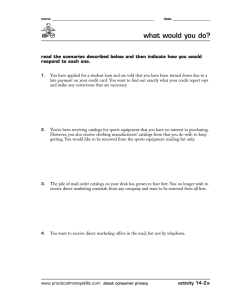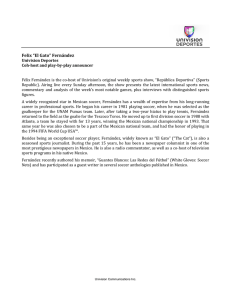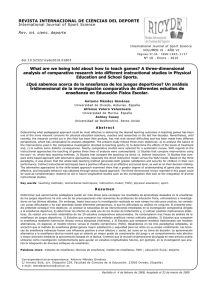Maquetación 1 - Revista de Psicología del Deporte
Anuncio
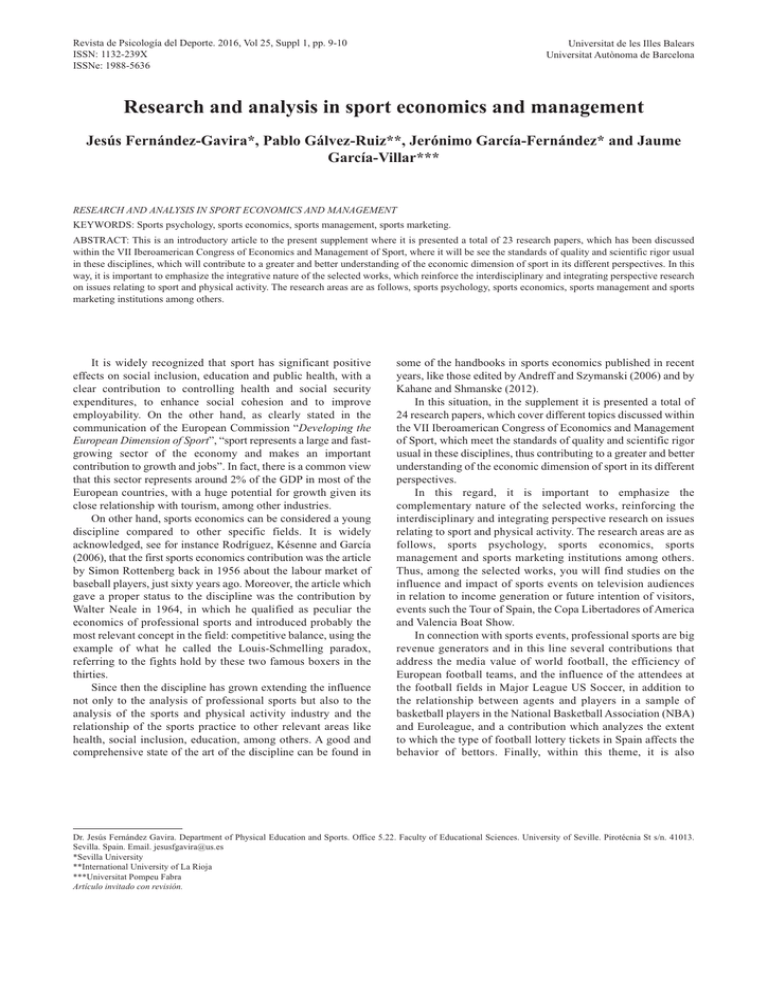
Revista de Psicología del Deporte. 2016, Vol 25, Suppl 1, pp. 9-10 ISSN: 1132-239X ISSNe: 1988-5636 Universitat de les Illes Balears Universitat Autònoma de Barcelona Research and analysis in sport economics and management Jesús Fernández-Gavira*, Pablo Gálvez-Ruiz**, Jerónimo García-Fernández* and Jaume García-Villar*** RESEARCH AND ANALYSIS IN SPORT ECONOMICS AND MANAGEMENT KEYWORDS: Sports psychology, sports economics, sports management, sports marketing. ABSTRACT: This is an introductory article to the present supplement where it is presented a total of 23 research papers, which has been discussed within the VII Iberoamerican Congress of Economics and Management of Sport, where it will be see the standards of quality and scientific rigor usual in these disciplines, which will contribute to a greater and better understanding of the economic dimension of sport in its different perspectives. In this way, it is important to emphasize the integrative nature of the selected works, which reinforce the interdisciplinary and integrating perspective research on issues relating to sport and physical activity. The research areas are as follows, sports psychology, sports economics, sports management and sports marketing institutions among others. It is widely recognized that sport has significant positive effects on social inclusion, education and public health, with a clear contribution to controlling health and social security expenditures, to enhance social cohesion and to improve employability. On the other hand, as clearly stated in the communication of the European Commission “Developing the European Dimension of Sport”, “sport represents a large and fastgrowing sector of the economy and makes an important contribution to growth and jobs”. In fact, there is a common view that this sector represents around 2% of the GDP in most of the European countries, with a huge potential for growth given its close relationship with tourism, among other industries. On other hand, sports economics can be considered a young discipline compared to other specific fields. It is widely acknowledged, see for instance Rodríguez, Késenne and García (2006), that the first sports economics contribution was the article by Simon Rottenberg back in 1956 about the labour market of baseball players, just sixty years ago. Moreover, the article which gave a proper status to the discipline was the contribution by Walter Neale in 1964, in which he qualified as peculiar the economics of professional sports and introduced probably the most relevant concept in the field: competitive balance, using the example of what he called the Louis-Schmelling paradox, referring to the fights hold by these two famous boxers in the thirties. Since then the discipline has grown extending the influence not only to the analysis of professional sports but also to the analysis of the sports and physical activity industry and the relationship of the sports practice to other relevant areas like health, social inclusion, education, among others. A good and comprehensive state of the art of the discipline can be found in some of the handbooks in sports economics published in recent years, like those edited by Andreff and Szymanski (2006) and by Kahane and Shmanske (2012). In this situation, in the supplement it is presented a total of 24 research papers, which cover different topics discussed within the VII Iberoamerican Congress of Economics and Management of Sport, which meet the standards of quality and scientific rigor usual in these disciplines, thus contributing to a greater and better understanding of the economic dimension of sport in its different perspectives. In this regard, it is important to emphasize the complementary nature of the selected works, reinforcing the interdisciplinary and integrating perspective research on issues relating to sport and physical activity. The research areas are as follows, sports psychology, sports economics, sports management and sports marketing institutions among others. Thus, among the selected works, you will find studies on the influence and impact of sports events on television audiences in relation to income generation or future intention of visitors, events such the Tour of Spain, the Copa Libertadores of America and Valencia Boat Show. In connection with sports events, professional sports are big revenue generators and in this line several contributions that address the media value of world football, the efficiency of European football teams, and the influence of the attendees at the football fields in Major League US Soccer, in addition to the relationship between agents and players in a sample of basketball players in the National Basketball Association (NBA) and Euroleague, and a contribution which analyzes the extent to which the type of football lottery tickets in Spain affects the behavior of bettors. Finally, within this theme, it is also Dr. Jesús Fernández Gavira. Department of Physical Education and Sports. Office 5.22. Faculty of Educational Sciences. University of Seville. Pirotécnia St s/n. 41013. Sevilla. Spain. Email. [email protected] *Sevilla University **International University of La Rioja ***Universitat Pompeu Fabra Artículo invitado con revisión. Jesús Fernández-Gavira, Pablo Gálvez-Ruiz, Jerónimo García-Fernández and Jaume García-Villar discussed sponsorship, using for that purpose the website of a professional tennis sport event. The profile analysis and consumer behavior are important aspects for sports services organizations, in this respect the profitability of management Spanish sports facilities organizations in relation to its size. The type of customer is analyzed after a segmentation analysis of the public sports centers in Barcelona, and an evolution of the financial results of the fitness industry is offered over a period which comprises a decade. On the other hand, closely related to the previous work, the organizational environment is analyzed in terms of the type of sports center, a study on the loyalty of users of public sports services is offered, the loyalty model is analyzed within the business fitness low-cost model, the optimal sample size for a study on the perception of users is calculated, the relationship between the service experience and perceived value among activities with and without instructor, and the impact of the behavior of former customers in low-cost fitness centres, media and Premium. All in all, these contributions represent a good example of the potential of the research in sports and physical activity from an economic and managerial perspective, in close relationship with other fields like psychology or consumer behavior. Additionally, the empirical characteristic of most of the papers in this supplement adds an additional dimension to the usefulness of these contributions as far as the results can be used by firms and institutions in the sport industry to improve their performance. INVESTIGACIÓN Y ANÁLISIS DE LA GESTIÓN Y ECONOMÍA DEL DEPORTE PALABRAS CLAVES: Psicología del deporte, economía del deporte, gestión deportiva, marketing deportivo RESUMEN: Se trata de un artículo de introducción al presente suplemento, en él se presenta un total de 23 trabajos de investigación, los cuales se han tratado en el VII Congreso Iberoamericano de Economía y Gestión del Deporte, en ellos se pueden observar los estándares de calidad y rigor científico habituales en estas disciplinas, con ello esperamos contribuir a una mayor y mejor comprensión de las diferentes perspectivas de la dimensión económica del deporte. De esta manera, es importante hacer hincapié en la naturaleza integradora de las obras seleccionadas, las cuales refuerzan la perspectiva de la investigación en temas relacionados con el deporte y la actividad física. Las áreas de investigación son las siguientes, psicología del deporte, economía del deporte, gestión del deporte y marketing del deporte entre otros. References Andreff, W. and Szymanski, S. (2006). Handbook on the Economics of Sport. Edward: Elgar Publishing. Kahane, L. and Shamnske, S. (2012). The Oxford Handbook of Sports Economics, Vol. 1 and Vol. 2, Oxford University Press Neale, W. C. (1964). The Peculiar Economics of Professional Sports. Quarterly Journal of Economics, 78, 1-14. Rodríguez, P., Késenne, S. and García, J. (2006). Sports Economics After Fifty Years: Essays in Honour of Simon Rottenberg. Oviedo: Ediciones de la Universidad de Oviedo. Rottenberg, S. (1956). The Baseball Players’ Labor Market. Journal of Political Economy, 64, 242-258. 10 Revista de Psicología del Deporte. 2016, Vol 25, Suppl 1, pp. 9-10
